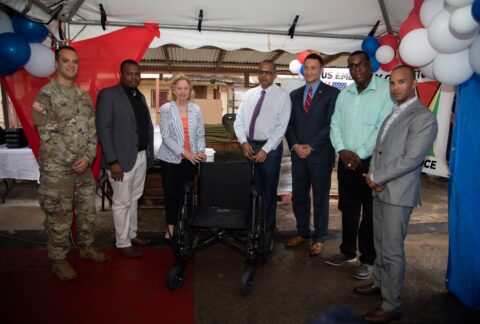“The women who make up the Guatemalan Army are, like the rest of the members of this institution, soldiers in the service of their country, who serve without distinctions, other than those earned by their meritorious acts. Many of them, with their service, have strengthened the institutional response to the Eta and Iota weather phenomena, which caused serious damage to the country, leaving more than 1.7 million people affected,” Lieutenant General Juan Carlos Alemán Soto, Guatemalan minister of Defense, said.

From November 2 to December 2, 2020, U.S. service members, led by Joint Task Force Bravo (JTF-Bravo*), supported disaster relief efforts in Colombia, Guatemala, Honduras, and Panama, in the aftermath of hurricanes Eta and Iota. The U.S. Army carried out air rescue operations to save lives, delivering aid and supplies to each affected country. The participation of military women in these relief efforts, reconstruction, and distribution of humanitarian aid, as mentioned by Lt. Gen. Alemán Soto, was key.
“With the knowledge, experience, skills, and great military spirit that characterize them, female personnel have joined in all the tasks that these emergencies have required, providing support from the very beginning in search and rescue missions and in loading, unloading, and distributing food to the population in the affected areas. Also, [they have participated] in border security and enforcing mobility restriction measures, as well as in the process of damage assessment and post-emergency needs analysis, which are currently being carried out to determine the damage to national infrastructure,” the Guatemalan Defense minister added.
Eta was a devastating Category 4 hurricane, which caused severe damage in parts of Central America in early November 2020. Hurricane Iota was the last Atlantic hurricane to reach Category 5 and the second Category 5 Atlantic hurricane ever recorded in November (the other was the hurricane that devastated Cuba in 1932). Iota caused serious damage in areas of Central America already devastated by Hurricane Eta less than two weeks earlier. Both were unprecedented tragedies.
Heavy machinery support

“We provided support with heavy machinery. Then, we mobilized a convoy with a front-end loader, a mini-loader, a backhoe, and a tipper truck. We worked at [kilometer] 153 in Pasmolón village, Tactic municipality of Alta Verapaz [department], because there was a mudslide on the main road. So we had to clear it with the convoy, with the backhoe, and the front-end loader,” said Guatemalan Army Second Lieutenant Wendy Audrey Saquic Melecio, who is on active duty in the “Teniente Coronel de Ingenieros e Ingeniero Francisco Vela Arango” Army Corps of Engineers.
At the request of the Honduran and the Panamanian governments, the JTF-Bravo Situational Assessment Team — made up of 27 service members, two UH-60 Black Hawks, and two CH-47 Chinooks — was quickly deployed from Soto Cano Air Base to San Pedro Sula, Honduras, where it provided immediate life-saving support in areas devastated by Hurricane Eta. In Panama, JTF-Bravo supported rescue efforts with about 20 service members, a UH-60 Black Hawk, and two CH-47 Chinooks. “As partners and neighbors to Honduras and Panama, we are assisting our friends in their time of need,” U.S. Army Colonel John Litchfield, JTF-Bravo commander, said at the time.
National emergency

A few days later, Guatemala joined Honduras and Panama in declaring a national emergency and requested immediate U.S. government assistance to save lives. The mission evolved into a collaborative effort among the governments of host nations and organizations, U.S. Southern Command, the U.S. Agency for International Development (USAID), and the U.S. embassies in each of these countries. By November 12, 2020, there were some 250 troops from JTF-Bravo, U.S. Army South, Special Operations Command South, and other U.S. Southern Command entities, spread across Honduras, Panama, and Guatemala.
“Thank God, they [the U.S. military] were always looking out for our communities. We used to walk about two and a half hours to reach a community, because it was completely cut off. There was a lot of mud, and they always stayed until the last moment. They said, ‘No, you are not alone, and neither are the people of the community.’ They brought medicine, food. They brought clothes, mattresses. They brought all kinds of help to the communities,” Guatemalan Army Private Lesvia Leticia Gallardo Morales told Diálogo. Assigned to the “Coronel Antonio José de Irisarri” Sixth Infantry Brigade, she took part in relief efforts.
According to the National Coordinator for Disaster Reduction (CONRED, in Spanish) and the Guatemalan Presidency’s Secretariat for Planning and Programming (SEGEPLAN, in Spanish), hurricanes Eta and Iota caused losses worth $780 million in Guatemala. Keyla Gramajo, SEGEPLAN director, said there were “14 days of floods, landslides, and mudflows” caused by both hurricanes, with damages in 16 of the country’s 22 departments. Iota and Eta left 61 people dead and 99 missing in Guatemala, according to Guatemalan authorities’ final count. The hurricanes forced the evacuation of 311,317 people and caused damages that affected 1.7 million people in the Central American country, SEGEPLAN and CONRED reported.
Nevertheless, it was a very gratifying experience for those who worked in the relief efforts, “because these are moments in which one gives their all,” said Guatemalan Army Master Sergeant Berta Leonor Alemán Chajchic, assigned to the Humanitarian and Rescue Battalion UHR-CFAC. “In my position as a rescue worker, that’s my mission: to help the affected population, putting into practice everything I have learned to do a good job, [play] a good role, and for inhabitants to be at peace and trust us. Because the truth is that when they see the Battalion or someone wearing an orange vest, or that we are representing the Guatemalan Army, people trust us, and it’s as if their heroes were there.”
*Joint Task Force-Bravo (JTF-Bravo) is an expeditionary joint task force that operates under U.S. Southern Command in Central America to promote stability and security, as well as to combat transnational and transregional threat networks. JTF-Bravo operates from the Soto Cano Air Base in Honduras, 16 kilometers south of Comayagua city and 80 km north of Tegucigalpa, the capital.








